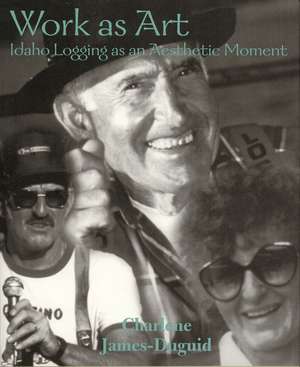Work as Art: Idaho Logging as an Aesthetic Moment
Autor Charlene James-Duguiden Limba Engleză Hardback – 31 dec 1995
Distributed by the University of Nebraska Press for the University of Idaho Press
Work as Art explores the everyday lives of independent loggers, showing them as hard working, community-minded individuals concerned about the future of the resources on which they depend for their livelihoods. Photographs of Orofino, logging and residents add another dimension to the written portrayal of the lives of independent loggers.
Preț: 165.81 lei
Nou
Puncte Express: 249
Preț estimativ în valută:
31.73€ • 33.19$ • 26.36£
31.73€ • 33.19$ • 26.36£
Carte indisponibilă temporar
Doresc să fiu notificat când acest titlu va fi disponibil:
Se trimite...
Preluare comenzi: 021 569.72.76
Specificații
ISBN-13: 9780893011901
ISBN-10: 0893011908
Pagini: 148
Ilustrații: photos, index
Dimensiuni: 196 x 237 x 15 mm
Greutate: 0.52 kg
Editura: Caxton Press
ISBN-10: 0893011908
Pagini: 148
Ilustrații: photos, index
Dimensiuni: 196 x 237 x 15 mm
Greutate: 0.52 kg
Editura: Caxton Press
Notă biografică
Charlene James-Duguid, formerly of the Smithsonian Institution, is an independent scholar and writer. She received her Ph.D. in Cultural Anthropology from The American University, Washington, D.C. and has taught at several universities, published numerous articles and is working on books on Rockwell Kent and on Crow Indian women.
Textul de pe ultima copertă
Work as Art explores the everyday lives of independent loggers. The author throws out the stereotypes of loggers as callous exploiters, showing instead loggers as hard working, community-minded individuals concerned about the future of the resources on which they depend for their livelihoods. Individuals selected from the logging community of Orofino, Idaho, were interviewed by the author to explore their private lives, community activities, and daily work patterns and attitudes. Dr. James-Duguid contends that logging is an art in the community, not merely a job, and this is expressed in the residents' concern for ethics and aesthetics in their lives. Various aspects of life in Orofino, a small, integrated community on the Clearwater river in northern Idaho, are brought into focus by the author. As well as examining the loggers' working world, Dr. James-Duguid talked to the town elders, contemporary loggers, and residents involved in putting on the annual Lumberjack Days festival. Throughout the book, individual lives are set against the environments in which individuals enact their various roles. Photographs of Orofino, logging, and residents add another dimension to the written portrayal of the lives of independent loggers.
